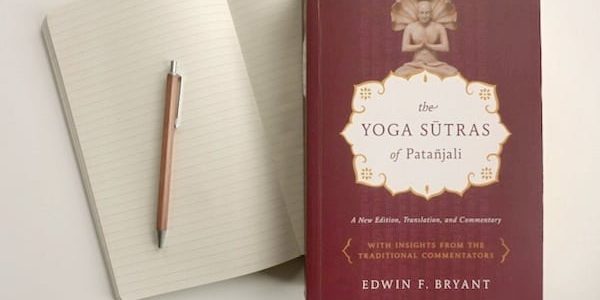
Why We Recommend This Book
I’ve consulted more than 20 books on The Yoga Sutras to create teaching tools and I’ve found this one to be a key resource. The commentary is deep and uniquely clear. It’s not surprising to learn that the author, Reverend Jaganath Carrera, is a direct disciple of Sri Swami Satchidananda and has been teaching the Yoga Sutras for over four decades. – Shelly
Book Quote
If we wish to realize the infinite Self as our True Identity, we need to transcend the limitation that is the ego. The problem is that efforts to transcend the ego often cause it to reassert itself emphatically as the fear that we will cease to exist if we proceed. Surrender to Ishwara is the easiest way to overcome this obstacle because it is not based on having the will power to overcome the threat of annihilation in order to transcend the ego. Instead, the ego becomes absorbed in loving reverence and willingly moves toward union with the beloved Divine.
Why We Recommend This Book
I’m awed by the unique power in this accessible, little book. Alan Finger has done a tremendous service by interpreting the Sutras from a tantric lens. As you might know, the focus of the Sutras (and the Samkya philosophy from which it draws) is discrimination between spirit and substance, while the focus of Tantra is on realizing through experience our connection with the Divine. These philosophies work well together as evidenced by the many people who are adherents of both the Eight Limbs of Yoga and practices such as chakra meditation, for example. However, rarely do we see the underlying philosophies weaved together and presented accessibly. I love this book and I think many others will, too! – Shelly
Book Quote
As yoga practitioners, reading the Sutras through this Tantric lens helps to put us back into an active and direct relationship with the possibility of experiencing samadhi right now, in this lifetime. The real gift of the yogic process is graceful transformation, which is the result of the spiral of understanding ever more deeply who we already are. This Tantric interpretation of yoga’s most revered literary work is humbly offered to all practitioners from every lineage in hopes of broadening access to this precious wisdom.

Why We Recommend This Book
No matter which Yoga Sutra translations you’ve read, you haven’t read one quite as valuable as this one. I feel like I’m safe in making such a sweeping statement because, despite consulting more than 20 translations, this one stands out as having the most accessible — while also comprehensive — insights from traditional commentaries. Another way it stands out is in the amount of context it provides regarding the time The Sutras were written and how the philosophy relates and contrasts to major schools of thought at the time, particularly Samkhya and Buddhist philosophy. This is a wonderful text that you don’t want to miss! – Shelly
Book Quote
The commentator Vacaspati Misra traces the etymology of yoga to one of the meanings of the root yuj, to contemplate, which, he points out, is the correct etymology here. The more established etymology from the perspective of modern historical linguistics is, of course, derived from the same Indo-European root as the English word, “yoke” … While this translation of the term is popularly found (and may be apt in other contexts such as the Gita, IX.34), it is best avoided in the context of the Yoga Sutras, since… the goal of yoga is not to join, but the opposite: to unjoin, that is, to disconnect purusa from prakrti. If the term is to mean “yoke,” it entails yoking the mind on an object of concentration without deviation.
While we have highlighted a few outstanding books, there are many wonderful books and we encourage you to peruse the entire list. Any one of these may be just what you need!
Our goal in providing book lists with quick links is to make it easy for you to get a sense for the variety of possible resources and to access them easily.
We receive no compensation of any sort for any recommendations or mentions. We are simply offering information as we feel called to do so.
Most of our book links use Amazon Associates, which pays a tiny commission on purchases made through those links (80 cents on a $20 book, for example). On average, we receive less than $15 per month from Amazon.